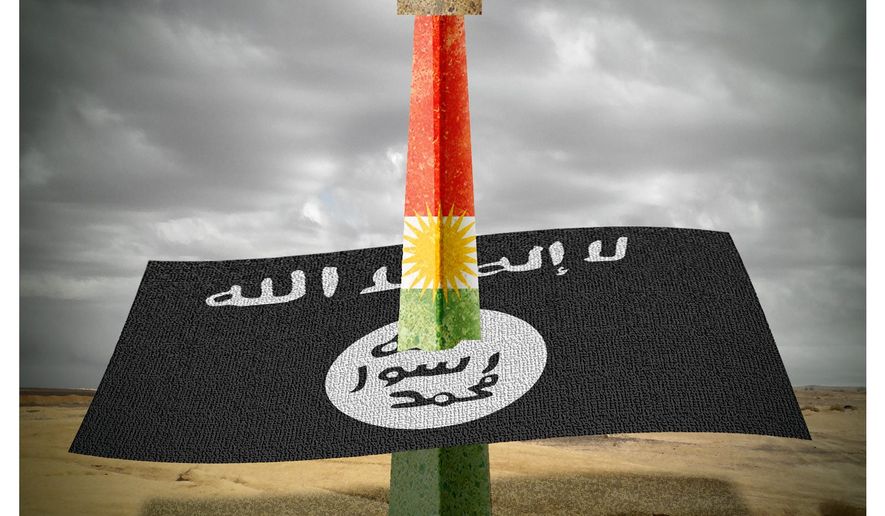OPINION:
In the Game of Thrones in Mesopotamia, the scenario is as Byzantine as it gets, and Team Obama is handling a complex diplomatic and military challenge, with the lives of millions of civilians and combatants in the balance.
The voices demanding that the Obama administration reverse its position on giving direct military aid to Kurdish forces in Iraq and Syria are insistent. Republican Sen. Joni Ernst of Iowa and an Army veteran of Iraq herself, pressed Defense Secretary Ashton Carter on the issue at a Senate Committee hearing on July 7. Mrs. Ernst told the secretary there was urgent need to directly arm the Iraqi Kurdish Peshmerga, which she called “our critical partner in the fight against ISIS.”
Mr. Carter said early in the hearing “when we provide arms to the Kurds we do it with the consent of the Iraqi government in order to indicate that we support the idea of a single Iraqi government in Baghdad, but we also want the Kurds in the fight and armed and that has not delayed our arming of the Kurds.”
Is anyone confused yet? If you are, you are not alone. Washington says it is providing plenty of military aid for the Kurdish forces, but it relies on the Iraq central government in Baghdad to distribute the armored personnel carriers and rockets to the Kurdish Peshmerga, who say they aren’t getting them.
The issue has taken on more urgency as the seesaw battle for the Syrian border town of Kobani has claimed hundreds of more civilian death in recent days. As many as 300 civilians were brutally massacred in Kobani. until June 28 when Kurdish militia and Free Syrian fighters pushed ISIS several kilometers out of the town. But that was not before the ISIS invaders had gone house to house to kill any civilian they could find, according to Rudaw, a Kurdish news site. Kurdish fighters supported by Peshmerga artillery and coalition airstrikes have been pushing ISIS back since the surprising retaking of the Syrian border town of Tal Abyad on June 16.
A recent news video from Vice.com quotes Masrour Barzani, chancellor of the Kurdish Security Council, saying the Peshmerga are outgunned in their clashes with ISIS. The Peshmerga say they need armor-piercing artillery and rockets. ISIS troops reportedly deploy explosive-laden trucks and Humvees driven by suicide bombers. Kurdish militia cannot defend against them without rockets.
An amendment to the National Defense Authorization Act that would have authorized the Obama administration to give aid directly to the Kurdish Regional Government was voted down by the Senate in mid-June but surely will come up for reconsideration. The measure would have authorized the United States to ship anti-tank weaponry, body armor and communications equipment to the Kurdish peshmerga.
“We should arm the Kurds,” says James Hanson, vice president of the Center for Security Policy, who says: “It would make all the difference in the world. Baghdad has stopped shipping all heavy weaponry to Kurdish forces and sending virtually nothing to Sunni militias in Anbar. Giving heavy arms to the Peshmerga would increase the stability of the one region in Iraq that is relatively secure.”
“The formal weapons transfers from the central government in Baghdad tend to be both inconsistent and inadequate, for two reasons,” according to Christopher Harmer, a senior analyst with the Institute for the Study of War in Washington.
“First, the central government in Baghdad is under tremendous pressure to whip the Iraqi Security Forces (ISF) into shape. ISF has not performed well so far in this war, and the central government in Baghdad doesn’t want to divert any weapons, ammunition, or equipment away from ISF toward the Peshmerga. Second, the central government in Baghdad is still committed to restoring the authority of the Iraqi government across the whole of Iraqi territory; consequently, they want the Peshmerga to have just enough weapons, ammunition and equipment to hold back ISIS, but no more than is absolutely necessary.
“Giving aid directly to the Peshmerga would help in the short term, but make it more difficult to reunify Iraq in the long term,” Mr. Harmer says.
The Senate vote in June to arm the Kurds did not fall along party lines. Seven Republicans voted against it, while seven Democrats voted for it. Both Mr. Carter and Secretary of State John Kerry have written briefs arguing that arming the Kurds would threaten the delicate balance of parties that make up the Iraqi central government. True, arming the Kurds would embarrass Baghdad, and there is no guarantee that it wouldn’t be seen as a provocation by Turkey, whose government fears the formation of a Kurdish breakaway state on the its border with Syria and Iraq.
Yet, many argue that the Kurds are the natural allies of the West: They have been allied with Washington for decades, and all agree that the Kurds are making steady gains in the fight with ISIS. Not giving arms to the Kurds when they need it the most could give ISIS the breathing room it needs to rebound. Arming the Kurds is a diplomatic risk worth taking.
• Douglas Burton is a former opinion editor for Insight on the News and served as a U.S. State Department official in Iraq from 2005 to 2007. Marios Efthymiopoulos is assistant professor of international security and strategy at the American University in the Emirates.




Please read our comment policy before commenting.